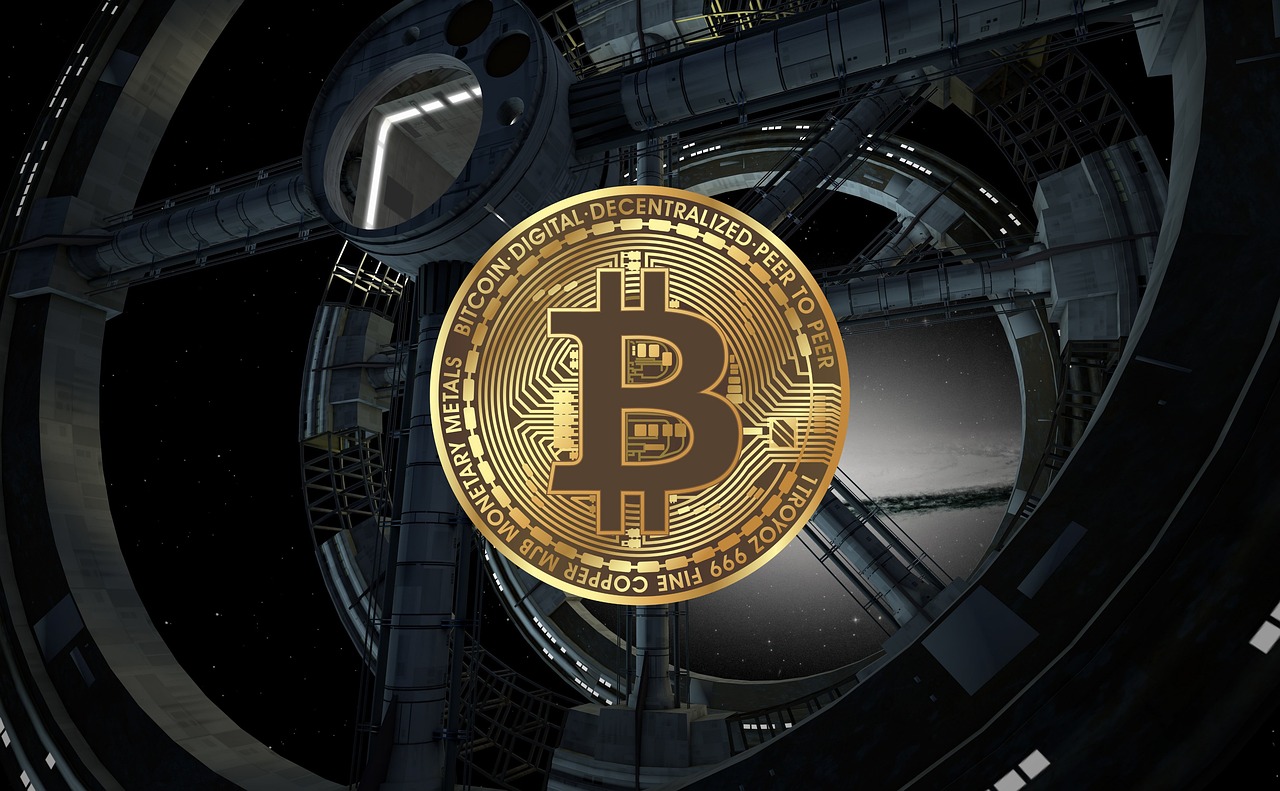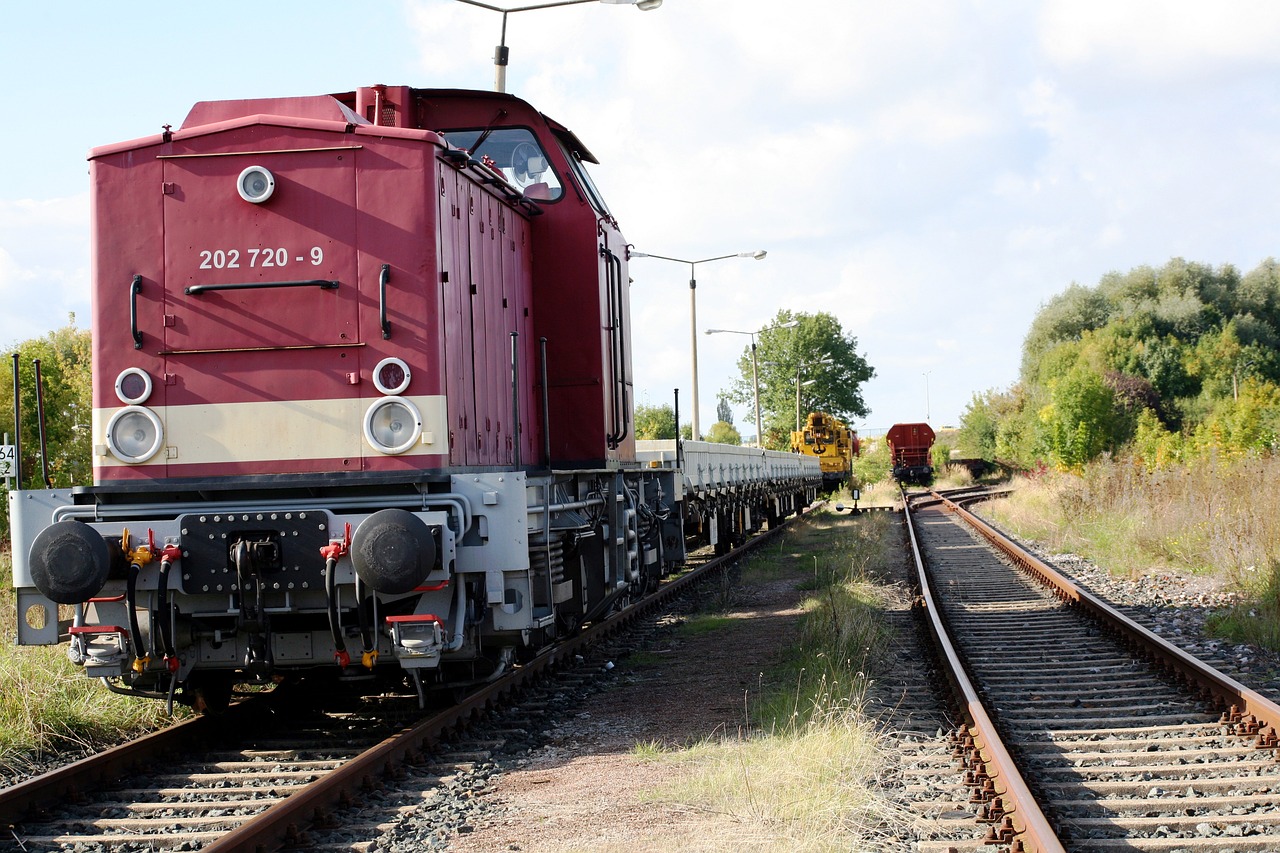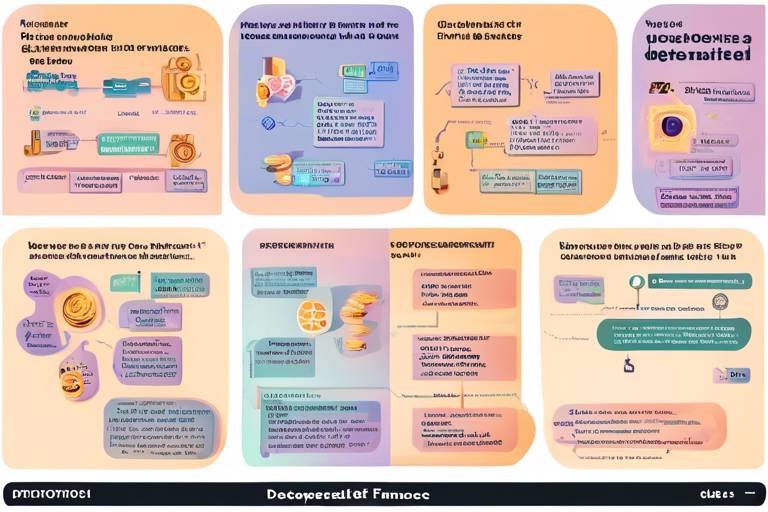How Blockchain Can Facilitate Ethical Supply Chain Practices
In today's rapidly evolving marketplace, the demand for transparency and ethical practices in supply chains has never been more critical. Consumers are becoming increasingly aware of the origins of their products, and they want to ensure that their purchases contribute to a sustainable and ethical economy. Blockchain technology emerges as a game-changer in this scenario, offering a robust solution to enhance transparency, accountability, and ethical standards across various industries. This article dives deep into how blockchain can revolutionize supply chains, making them not only more efficient but also more aligned with ethical practices.
At its core, blockchain is a decentralized digital ledger that records transactions across multiple computers in such a way that the registered transactions cannot be altered retroactively. This makes it a powerful tool for ensuring data integrity and trust. Each block in the chain contains a number of transactions, and every time a new transaction occurs on the blockchain, a record of that transaction is added to every participant's ledger. This decentralized nature means that no single entity has control over the entire chain, promoting a level of transparency that traditional systems simply cannot match.
Why should businesses care about maintaining ethical supply chains? The answer is simple: brand reputation, consumer trust, and the overall sustainability of our planet. In an age where information is at our fingertips, consumers are more informed than ever about where their products come from and the practices involved in their production. Companies that fail to adopt ethical practices risk damaging their reputation and losing customer loyalty. Moreover, ethical supply chains contribute to a sustainable future, reducing environmental impact and promoting fair labor practices.
Traditional supply chains face numerous challenges that can hinder ethical practices. Issues such as lack of transparency, inefficiencies, and ethical concerns plague many industries. For instance, consider the following:
- Transparency Issues: Many supply chains operate in silos, making it difficult to track the origin of products and verify ethical practices.
- Accountability Gaps: In traditional systems, it can be challenging to hold specific parties accountable for unethical practices.
- Inefficiencies: Lack of real-time data can lead to delays and increased costs, ultimately affecting the end consumer.
One of the most significant problems in traditional supply chains is the lack of visibility. Consumers often have no way of knowing where their products come from or the conditions under which they were produced. Blockchain technology addresses this by providing real-time tracking and verification of goods from their origin to the consumer. Imagine being able to scan a QR code on your product and instantly access its entire history—where it was grown, how it was processed, and the labor conditions involved. This level of transparency not only builds consumer trust but also encourages brands to maintain high ethical standards.
In traditional supply chains, accountability often falls through the cracks. If something goes wrong—say a product is found to be substandard or unethical—pinpointing the responsible party can be a daunting task. Blockchain's immutable records change the game by creating a permanent and unchangeable record of every transaction. This means that every stakeholder in the supply chain can be held accountable for their actions, fostering a culture of responsibility and ethical behavior.
Blockchain's unique features, such as distributed ledgers and smart contracts, enable greater transparency throughout the supply chain. A distributed ledger means that every participant in the supply chain has access to the same information, eliminating discrepancies and ensuring that everyone is on the same page. Smart contracts automate processes and ensure that agreements are executed only when certain conditions are met, thereby reducing the potential for fraud and miscommunication.
To understand the practical implications of blockchain technology, let's look at some real-world examples of companies successfully implementing it to improve ethical practices.
In the food industry, blockchain is revolutionizing supply chains by ensuring traceability, reducing fraud, and enhancing food safety. For example, major retailers are using blockchain to track the journey of food products from farm to table. This not only helps in quickly identifying sources of contamination in case of foodborne illnesses but also assures consumers about the quality and safety of their food.
The fashion industry is another area where blockchain is making waves. Brands are adopting this technology to combat counterfeiting and verify sustainable practices. By providing consumers with transparent information about the origins of their products, companies can enhance their brand image and promote ethical labor conditions within their supply chains.
As we look to the future, the potential developments of blockchain technology in supply chains are exciting. Innovations may include enhanced interoperability between different blockchain systems, further integration with IoT devices for real-time data collection, and even the incorporation of artificial intelligence to analyze supply chain data for better decision-making. The broader implications for ethical practices globally could be profound, paving the way for a more transparent and responsible marketplace.
Q: What is blockchain technology?
A: Blockchain is a decentralized digital ledger that records transactions across multiple computers, ensuring data integrity and transparency.
Q: How does blockchain improve supply chain transparency?
A: Blockchain allows for real-time tracking of goods, providing consumers with access to product histories and ensuring accountability among stakeholders.
Q: Can blockchain help combat unethical practices in supply chains?
A: Yes, by creating immutable records, blockchain enhances accountability and encourages ethical behavior among all parties involved.

Understanding Blockchain Technology
To truly grasp the revolutionary potential of blockchain technology, we must first understand its core principles and functionalities. At its essence, blockchain is a decentralized digital ledger that securely records transactions across multiple computers. This decentralization is crucial because it eliminates the need for a central authority, making the system more resilient to fraud and manipulation. Imagine a library where every book is a transaction, and instead of one librarian managing the entire collection, every visitor has a copy of the library’s catalog. This way, if one book goes missing, everyone else can verify its existence and location.
The fundamental building blocks of blockchain include blocks, chains, and nodes. Each block contains a list of transactions and is linked to the previous block, forming a secure chain. Nodes are individual computers that participate in the network, storing copies of the entire blockchain. This interconnectedness ensures that all changes to the ledger are visible to every participant, fostering an environment of transparency and trust.
One of the most exciting features of blockchain is the use of smart contracts. These are self-executing contracts with the terms of the agreement directly written into code. They automatically enforce and execute the terms without the need for intermediaries. Picture this: you order a pizza online, and as soon as the pizza is made, the payment is released automatically from your account to the restaurant’s account. This not only speeds up transactions but also reduces costs and potential disputes.
As we delve deeper into the world of supply chains, it becomes clear that blockchain technology offers solutions to many of the inefficiencies and ethical challenges that plague traditional systems. With its ability to provide a transparent and immutable record of every transaction, blockchain can enhance accountability and traceability, ensuring that every step of the supply chain is monitored and verified.
To summarize, the key features of blockchain technology that make it a game-changer in supply chain management include:
- Decentralization: Reduces reliance on central authorities.
- Transparency: All participants can view the same information.
- Security: Transactions are encrypted and immutable.
- Smart Contracts: Automates agreements and reduces the need for intermediaries.
By leveraging these characteristics, businesses can create more ethical, efficient, and transparent supply chains, ultimately benefiting both themselves and their customers.

The Importance of Ethical Supply Chains
In today's rapidly evolving market, the importance of ethical supply chains cannot be overstated. As consumers become increasingly aware of the impact their purchasing decisions have on the world, businesses are recognizing that maintaining ethical practices is not just a moral obligation but also a strategic advantage. An ethical supply chain enhances brand reputation, fosters consumer trust, and promotes overall sustainability. But what does this really mean for businesses and consumers alike?
First and foremost, an ethical supply chain is essential for building and maintaining brand reputation. Companies that prioritize ethical sourcing and manufacturing processes are often viewed more favorably by consumers. In fact, a recent study showed that 73% of consumers are willing to pay more for products from companies committed to sustainability and ethical practices. This shift in consumer behavior highlights the importance of transparency and accountability within supply chains. When businesses can demonstrate that they are sourcing materials responsibly and treating workers fairly, they cultivate a loyal customer base that values these principles.
Moreover, ethical supply chains contribute significantly to consumer trust. In an era where misinformation is rampant, consumers are increasingly seeking transparency in the products they buy. They want to know where their products come from, how they are made, and the conditions under which they are produced. By adopting ethical practices, businesses can provide this information, thereby fostering a deeper connection with their customers. Trust is a two-way street; when consumers feel confident in a brand's integrity, they are more likely to become repeat buyers and advocates for the brand.
Another critical aspect of ethical supply chains is their role in promoting overall sustainability. As the world grapples with environmental challenges, businesses are under pressure to minimize their ecological footprint. Ethical supply chains often incorporate sustainable practices, such as reducing waste, utilizing renewable resources, and ensuring fair labor conditions. This not only benefits the environment but also enhances the long-term viability of businesses. By investing in sustainable practices, companies can reduce costs, improve efficiency, and position themselves as leaders in their industries.
However, achieving ethical supply chains is not without its challenges. Companies must navigate complex global networks and ensure compliance with various regulations and standards. This is where blockchain technology can play a transformative role, enhancing transparency and accountability throughout the supply chain. By leveraging blockchain, businesses can track products from origin to consumer, ensuring that ethical practices are maintained at every step.
In conclusion, the importance of ethical supply chains extends beyond mere compliance with regulations; it is about creating a positive impact on society and the environment. As consumers continue to demand more from the brands they support, businesses that embrace ethical practices will not only thrive but also contribute to a more sustainable and equitable world. The journey towards ethical supply chains may be complex, but the rewards—both for businesses and consumers—are well worth the effort.

Challenges in Traditional Supply Chains
Traditional supply chains are often riddled with a myriad of challenges that can hinder efficiency and ethical practices. One of the most glaring issues is the lack of transparency. In a conventional supply chain, the flow of goods and information is often obscured by multiple intermediaries. This opacity makes it difficult for businesses and consumers alike to verify the origins of products, leading to potential ethical dilemmas. For example, how can a consumer be sure that their chocolate was sourced sustainably when the journey from bean to bar involves numerous parties, each adding layers of complexity?
Another significant challenge is the inefficiencies that plague traditional supply chains. Delays, miscommunications, and errors can arise at any stage, from manufacturing to delivery. These inefficiencies not only inflate costs but can also lead to missed opportunities. Imagine a scenario where a retailer runs out of stock due to a delay in shipment; this not only impacts sales but also diminishes customer trust. In fact, studies show that inefficiencies can cost businesses up to 30% of their operational expenses. That's a staggering figure!
Moreover, ethical concerns are rampant in traditional supply chains. Issues like child labor, unsafe working conditions, and environmental degradation often go unchecked due to the lack of oversight. In many cases, consumers remain blissfully unaware of the ethical implications of their purchases. A well-known example is the fashion industry, where poor labor practices are often hidden behind the curtain of fast fashion. The question arises: should consumers bear the responsibility of ensuring ethical practices, or should companies be held accountable?
To illustrate these challenges, consider the following table that outlines some common issues faced in traditional supply chains:
| Challenge | Description | Impact |
|---|---|---|
| Lack of Transparency | Obscured flow of goods and information | Inability to verify product origins |
| Inefficiencies | Delays and miscommunications | Increased operational costs |
| Ethical Concerns | Child labor and unsafe working conditions | Consumer distrust and brand damage |
These challenges not only affect the businesses involved but also have broader implications for consumers and the environment. As we move towards a more interconnected world, the need for ethical practices in supply chains has never been more pressing. With the advent of technologies like blockchain, there is hope for overcoming these barriers. But until that becomes the norm, the questions remain: How can we ensure accountability? How can we enhance visibility? And most importantly, how can we create a system that prioritizes ethical practices for everyone involved?

Transparency Issues
In today's fast-paced world, the lack of transparency in traditional supply chains can often feel like navigating through a foggy landscape. Businesses and consumers alike are left guessing about the origins of products, the conditions under which they were made, and the journey they took to reach the store shelves. This opacity not only breeds distrust among consumers but also opens the door to unethical practices, such as labor exploitation and environmental degradation. Imagine buying a product, only to discover later that its production involved child labor or harmful environmental practices. This is a reality many consumers face, and it’s a problem that blockchain technology aims to solve.
Blockchain operates as a decentralized ledger, meaning that every transaction is recorded across multiple locations rather than in a single, centralized database. This structure allows for real-time tracking of goods as they move through the supply chain. For instance, if a consumer wants to know where their food comes from, they can scan a QR code on the packaging, which links them directly to a blockchain record detailing the entire journey of that product—from farm to table. This level of transparency not only empowers consumers but also encourages companies to maintain ethical practices, knowing that their actions are being monitored and recorded.
Moreover, the use of blockchain can significantly reduce instances of fraud. In industries like food and pharmaceuticals, where safety is paramount, the ability to trace the origin and journey of products can prevent dangerous counterfeits from entering the market. For example, a recent study highlighted that implementing blockchain in food supply chains reduced the time required to trace a product's origin from days to mere seconds. This is not just a win for consumers; it also enhances brand reputation and fosters trust between businesses and their customers.
However, it’s essential to acknowledge that while blockchain technology offers a promising solution to transparency issues, its implementation is not without challenges. Companies need to invest in the necessary infrastructure and training to ensure that all stakeholders can effectively utilize the technology. Additionally, there must be a collective effort among industry players to standardize practices and ensure that the data recorded on the blockchain is accurate and reliable. Without these measures, the potential benefits of blockchain could be undermined, leaving consumers back in the dark.
In summary, the transparency issues plaguing traditional supply chains can be effectively addressed through the innovative application of blockchain technology. By providing real-time visibility into the origins and journey of products, businesses can not only enhance consumer trust but also promote ethical practices across the board. As we continue to embrace this technology, the fog of uncertainty surrounding supply chains may soon lift, revealing a clearer, more responsible path forward.
- What is blockchain technology?
Blockchain is a decentralized digital ledger that records transactions across many computers, making it nearly impossible to alter or hack the system. - How does blockchain improve supply chain transparency?
By allowing real-time tracking of products from origin to consumer, blockchain ensures that all stakeholders have access to the same information, reducing the risk of fraud and unethical practices. - What industries can benefit from blockchain in supply chains?
Industries such as food, pharmaceuticals, and fashion are already seeing significant improvements in transparency and ethical practices through blockchain implementation. - Are there challenges to implementing blockchain technology?
Yes, challenges include the need for investment in infrastructure, training for stakeholders, and the establishment of standardized practices across the industry.

Accountability Gaps
In the intricate web of traditional supply chains, accountability often resembles a game of hide and seek. With numerous stakeholders involved—from raw material suppliers to manufacturers and distributors—pinpointing responsibility can become a Herculean task. When issues arise, such as unethical labor practices or environmental violations, the question lingers: who is truly accountable? This ambiguity not only breeds distrust among consumers but also tarnishes the brand image of businesses that may be inadvertently linked to these unethical practices.
Blockchain technology emerges as a beacon of hope in this murky landscape. By utilizing an immutable ledger, blockchain ensures that every transaction is recorded in a transparent manner, leaving a permanent trail of accountability. Each participant in the supply chain can be held responsible for their actions, as every step—from sourcing materials to the final delivery—is documented. This level of transparency fosters a culture of accountability, where stakeholders are aware that their actions are being monitored and recorded.
Moreover, the use of smart contracts—self-executing contracts with the terms of the agreement directly written into lines of code—further enhances accountability. These contracts automatically enforce compliance with agreed-upon standards and regulations. For instance, if a supplier fails to meet ethical labor standards, the smart contract can trigger penalties or halt transactions, effectively holding them accountable without the need for lengthy legal disputes. This not only protects consumers but also encourages businesses to adopt more ethical practices.
To illustrate the potential of blockchain in bridging accountability gaps, consider the following table that outlines traditional versus blockchain-enabled supply chains:
| Aspect | Traditional Supply Chain | Blockchain-Enabled Supply Chain |
|---|---|---|
| Transparency | Lack of visibility into processes | Real-time tracking of goods |
| Accountability | Difficult to trace responsibility | Immutable records enhance responsibility |
| Dispute Resolution | Lengthy and costly legal processes | Automated enforcement via smart contracts |
As we move towards a more ethically conscious market, the ability to hold parties accountable is paramount. Blockchain not only addresses the challenges of accountability but also empowers consumers with the knowledge they need to make informed choices. With a clear view of the supply chain, consumers can support brands that align with their values, fostering a marketplace that prioritizes ethical practices.
- What is blockchain technology? Blockchain is a decentralized digital ledger that records transactions across many computers, ensuring that the record cannot be altered retroactively.
- How does blockchain improve accountability in supply chains? By providing an immutable record of all transactions and using smart contracts to enforce compliance, blockchain increases transparency and responsibility among all parties involved.
- Can blockchain technology be applied to any industry? Yes, blockchain can be applied across various industries, including food, fashion, and pharmaceuticals, to enhance transparency and ethical practices.

How Blockchain Enhances Transparency
When we talk about transparency in supply chains, we often think of it as a distant dream, something that seems just out of reach. However, blockchain technology is here to change that narrative dramatically. Imagine a world where every transaction, every movement of goods, and every interaction between parties is recorded in a way that is not only secure but also verifiable by anyone involved in the process. This is the essence of blockchain—a decentralized ledger that provides a transparent view of the entire supply chain journey.
One of the standout features of blockchain is its distributed ledger technology (DLT). This means that instead of a single entity controlling the data, multiple parties hold copies of the same information. Each participant in the supply chain has access to a shared version of the truth, which significantly reduces the chances of fraud or misinformation. For instance, if a product is shipped from a manufacturer to a retailer, each step of the journey can be recorded on the blockchain, allowing anyone to trace the product's origin and verify its authenticity at any time. This not only builds trust among consumers but also strengthens relationships between businesses.
Another powerful aspect of blockchain is the use of smart contracts. These are self-executing contracts with the terms of the agreement directly written into code. They automatically enforce and execute agreements when predefined conditions are met, eliminating the need for intermediaries and reducing the potential for disputes. For example, a smart contract could automatically release payment to a supplier once goods are delivered and verified, ensuring that all parties are held accountable without the need for manual oversight. This level of automation and assurance fosters a culture of transparency and trust, which is essential in today's ethically-conscious market.
To illustrate how blockchain enhances transparency, consider the following table that highlights key features and benefits:
| Feature | Benefit |
|---|---|
| Decentralization | Reduces fraud and misinformation by providing a shared, immutable record. |
| Real-time Tracking | Allows stakeholders to monitor the movement of goods in real-time, enhancing accountability. |
| Smart Contracts | Automates processes and ensures compliance with agreements without intermediaries. |
| Immutable Records | Ensures that once data is recorded, it cannot be altered, building trust among all parties. |
In a world where consumers are becoming increasingly concerned about the origins of their products, transparency is no longer just a nice-to-have; it’s a necessity. Blockchain technology empowers businesses to provide clear, verifiable information about their supply chains, from sourcing to delivery. This level of transparency not only enhances brand reputation but also aligns with the growing demand for ethical practices in business.
In conclusion, blockchain is not just a technological advancement; it’s a revolutionary approach to how we think about transparency in supply chains. By leveraging its capabilities, businesses can foster trust, accountability, and ethical practices that resonate with consumers, creating a win-win situation for all stakeholders involved.

Case Studies of Blockchain in Supply Chains
In recent years, the application of blockchain technology in supply chains has grown significantly, providing innovative solutions to age-old problems. This section delves into some compelling real-world examples where companies have successfully integrated blockchain, showcasing its potential to enhance ethical practices and operational efficiency. Each case study not only highlights the technology's versatility but also demonstrates how it can transform industries by fostering transparency and accountability.
One of the most notable examples can be found in the food supply chain, where companies like Walmart and IBM have joined forces to create a blockchain-based system called Food Trust. This initiative aims to trace food products from farm to table, ensuring that consumers can verify the origins of their food. By leveraging blockchain, Walmart can reduce the time it takes to trace the source of food products from days to mere seconds. This rapid traceability is crucial in cases of foodborne illnesses, allowing for swift action to be taken to protect public health.
Another fascinating case is in the fashion industry, where brands such as Everledger and Provenance are using blockchain to combat counterfeiting and improve ethical practices. Everledger, for instance, has developed a blockchain platform that tracks the provenance of luxury goods, ensuring that consumers can verify the authenticity of their purchases. This not only protects brand integrity but also promotes sustainable practices by allowing consumers to see the entire lifecycle of a product, from raw materials to the final sale. As a result, brands that adopt such technologies can enhance their reputations and build stronger connections with ethically-minded consumers.
Furthermore, companies like De Beers are utilizing blockchain to ensure ethical sourcing of diamonds. Through their platform, Tracr, they provide a transparent ledger that tracks diamonds from the mine to the retailer. This initiative not only helps to eliminate conflict diamonds from the supply chain but also reinforces consumer trust, as buyers can be assured that their purchases are ethically sourced. The implications of such transparency are profound, as they encourage responsible mining practices and bolster the brand's reputation in an increasingly conscientious market.
In addition to these case studies, the logistics sector is also reaping the benefits of blockchain technology. Companies like Maersk are exploring blockchain to streamline their shipping processes. By digitizing and securing shipping documents on a blockchain, Maersk aims to reduce paperwork and delays, ultimately leading to more efficient and transparent operations. This not only saves time and costs but also enhances accountability among all parties involved in the shipping process.
As we can see, the integration of blockchain in supply chains is not just a passing trend; it is a transformative force that is reshaping industries. The success stories of Walmart, Everledger, De Beers, and Maersk illustrate how blockchain can address critical challenges, promote ethical practices, and enhance operational efficiency. With each successful implementation, the potential for blockchain to revolutionize supply chains becomes increasingly evident, paving the way for a more transparent and responsible future.
- What is blockchain technology?
Blockchain is a decentralized digital ledger that records transactions across many computers securely and transparently.
- How does blockchain improve supply chain transparency?
Blockchain allows for real-time tracking of products, ensuring that all parties have access to the same information and can verify the authenticity of goods.
- Can blockchain help reduce fraud in supply chains?
Yes, by providing an immutable record of transactions, blockchain can significantly reduce opportunities for fraud and counterfeiting.
- What industries are benefiting from blockchain technology?
Industries like food, fashion, logistics, and pharmaceuticals are among those seeing significant improvements from blockchain integration.

Food Supply Chains
The food industry is one of the most complex and critical sectors of our economy, impacting our health, environment, and overall quality of life. With the rise of consumer awareness regarding food safety and ethical sourcing, blockchain technology emerges as a revolutionary solution to transform food supply chains. Imagine being able to trace a tomato back to the farm it was harvested from, ensuring it was grown sustainably and handled safely. This is where blockchain shines, providing an unprecedented level of transparency and trust in food sourcing.
One of the key benefits of implementing blockchain in food supply chains is the ability to enhance traceability. By utilizing a decentralized ledger, every transaction—from the farm to the grocery store—can be recorded in real-time. This means that if there is a food safety issue, such as a contamination outbreak, companies can quickly identify the source and remove affected products from shelves almost immediately. This not only protects consumers but also minimizes financial losses for producers and retailers.
Furthermore, blockchain can significantly reduce fraud in food supply chains. With the increasing prevalence of food fraud—where products are misrepresented or adulterated—consumers are often left in the dark about the true origins of what they eat. Blockchain allows for the verification of claims, such as organic certification or fair trade practices, by providing a transparent record of all transactions. For example, if a brand claims that its coffee is sourced from a specific region in Colombia, blockchain can provide the proof needed to back that claim, ensuring that consumers are getting exactly what they pay for.
To illustrate the impact of blockchain on food supply chains, consider the following table that highlights how various companies have successfully integrated this technology:
| Company | Application | Impact |
|---|---|---|
| Walmart | Tracking produce | Reduced traceability time from 7 days to 2.2 seconds |
| IBM Food Trust | Food safety and transparency | Enhanced consumer trust through verified sourcing |
| Nestlé | Supply chain transparency | Improved accountability and ethical sourcing |
In addition to safety and fraud prevention, blockchain also promotes ethical practices by ensuring fair labor conditions throughout the supply chain. By providing a transparent record of transactions, stakeholders can verify that workers are treated fairly and paid appropriately. This is especially important in industries like agriculture, where labor exploitation can often go unnoticed. With blockchain, consumers can make informed choices, supporting brands that prioritize ethical labor practices.
As we look to the future, the integration of blockchain in food supply chains is not just a possibility; it's becoming a necessity. With the continuous demand for transparency and accountability, companies that adopt blockchain technology will not only enhance their operational efficiency but also build stronger relationships with their consumers. In a world where information is power, being able to provide a complete narrative of a product's journey from farm to table is invaluable.
- What is blockchain technology? Blockchain is a decentralized digital ledger that records transactions across multiple computers, ensuring that the information is secure, transparent, and immutable.
- How does blockchain improve food safety? By providing real-time tracking of food products, blockchain allows for quick identification of contamination sources, thus enhancing food safety.
- Can blockchain combat food fraud? Yes, blockchain enables verification of product claims, ensuring that consumers receive authentic and accurately represented food products.
- What are the benefits of ethical supply chains? Ethical supply chains enhance brand reputation, foster consumer trust, and contribute to sustainability efforts, ultimately benefiting both businesses and society.

Fashion Industry Applications
The fashion industry, often seen as a trendsetter in creativity and innovation, is now embracing blockchain technology to tackle some of its most pressing challenges. Imagine a world where every piece of clothing has a unique digital identity, allowing consumers to trace its journey from raw materials to the final product. This is not just a dream; it’s becoming a reality with blockchain. By integrating this technology, brands can enhance transparency, verify sustainable practices, and improve labor conditions across their supply chains.
One of the most significant applications of blockchain in fashion is in combating counterfeiting. The industry is plagued by counterfeit goods, which not only harm brand reputation but also deceive consumers. With blockchain's immutable ledger, every transaction and ownership change is recorded, making it nearly impossible to forge a product's authenticity. For instance, luxury brands are now using blockchain to provide consumers with a digital certificate of authenticity, allowing them to verify that their purchase is genuine. This not only boosts consumer confidence but also reinforces the brand's integrity.
Moreover, sustainability is a hot topic in fashion, and consumers are increasingly demanding transparency regarding the environmental and social impact of their purchases. Blockchain can play a crucial role here by enabling brands to showcase their sustainable practices. For example, through blockchain, a company can provide detailed information about the sourcing of materials, the conditions under which they were produced, and even the carbon footprint of each item. This level of transparency not only meets consumer demands but also holds brands accountable for their practices.
Additionally, blockchain can enhance labor conditions by ensuring fair wages and safe working environments. By tracking each step of the supply chain, companies can verify that their suppliers adhere to ethical labor practices. This not only protects workers but also aligns with the growing consumer preference for ethically produced goods. Imagine being able to scan a QR code on a garment and instantly access information about the workers who made it—where they are from, how much they are paid, and the conditions under which they work. This kind of transparency can lead to a more informed consumer base that supports ethical brands.
To illustrate the impact of blockchain in the fashion industry, consider the following table showcasing notable brands that have adopted this technology:
| Brand | Application of Blockchain | Impact |
|---|---|---|
| Provenance | Tracking the origin of materials | Enhanced transparency and consumer trust |
| Everledger | Combatting counterfeiting in luxury goods | Increased brand integrity and consumer confidence |
| Fashion for Good | Promoting sustainable practices | Encouragement of ethical sourcing and production |
In conclusion, the integration of blockchain technology in the fashion industry is not just a trend; it’s a transformative movement towards greater accountability, transparency, and sustainability. As consumers become more aware of the implications of their purchases, brands that leverage blockchain will not only stand out in a crowded market but also contribute positively to the global conversation about ethical fashion. The future is bright for those who embrace this technology, as it paves the way for a more responsible and transparent fashion industry.
- What is blockchain technology? Blockchain is a decentralized digital ledger that records transactions across many computers securely and transparently.
- How does blockchain combat counterfeiting in fashion? By providing an immutable record of ownership and authenticity, blockchain makes it difficult to forge products.
- Can blockchain improve labor conditions? Yes, it allows brands to verify ethical labor practices throughout their supply chains.
- What are the benefits of using blockchain for sustainability? Blockchain enhances transparency, enabling brands to showcase their sustainable practices and allowing consumers to make informed choices.

The Future of Blockchain in Supply Chains
As we gaze into the crystal ball of technology, one thing becomes clear: the future of blockchain in supply chains is not just promising; it’s downright revolutionary. Imagine a world where every product you buy comes with a digital passport, detailing its journey from raw materials to your shopping cart. This is not science fiction; it’s the potential reality that blockchain technology is creating. With its ability to offer unparalleled transparency, accountability, and efficiency, blockchain is set to redefine how we think about supply chains.
One of the most exciting prospects is the integration of blockchain with other emerging technologies. For instance, when combined with the Internet of Things (IoT), blockchain can facilitate real-time data sharing. Picture sensors embedded in products that automatically update their status on a blockchain ledger. This means that companies could monitor the conditions of goods, ensuring they meet quality standards throughout the supply chain. This synergy between blockchain and IoT not only enhances transparency but also improves decision-making processes, allowing businesses to respond to issues as they arise.
Furthermore, the rise of artificial intelligence (AI) in conjunction with blockchain technology opens up new avenues for predictive analytics. By analyzing historical data stored on a blockchain, AI can forecast demand trends and optimize inventory management. This could significantly reduce waste and improve sustainability efforts across various industries. The combination of these technologies could lead to a more agile supply chain, capable of adapting to changes in consumer behavior and market dynamics.
However, the journey toward widespread blockchain adoption in supply chains is not without its challenges. Issues such as scalability, regulatory compliance, and interoperability among different blockchain systems need to be addressed. Companies must also invest in training and educating their workforce to harness the full potential of this technology. Nevertheless, the benefits far outweigh the hurdles. As more organizations recognize the importance of ethical practices and consumer trust, the demand for blockchain solutions will only increase.
To illustrate the potential impact, consider the following table that outlines key areas where blockchain can drive improvements in supply chains:
| Area of Improvement | Blockchain Benefits |
|---|---|
| Transparency | Real-time tracking of goods, ensuring authenticity and origin verification. |
| Efficiency | Streamlined processes through smart contracts, reducing delays and costs. |
| Accountability | Immutable records that hold all parties responsible for their actions. |
| Sustainability | Enhanced ability to trace the environmental impact of products. |
As we look to the future, it’s essential to recognize that blockchain technology is not merely a trend; it’s a fundamental shift in how we approach supply chain management. Companies that embrace this change will not only enhance their operational efficiency but also build stronger relationships with consumers who demand transparency and ethical practices. The future is bright for blockchain in supply chains, and those who adapt will find themselves at the forefront of a new era in business.
- What is blockchain technology? Blockchain is a decentralized digital ledger that records transactions across many computers, ensuring that the record cannot be altered retroactively.
- How does blockchain improve supply chain transparency? By providing a secure and immutable record of all transactions, blockchain allows stakeholders to trace the journey of products in real-time.
- Are there any limitations to blockchain in supply chains? Yes, challenges include scalability, regulatory issues, and the need for industry-wide standards.
- What industries can benefit from blockchain in supply chains? Industries such as food, fashion, pharmaceuticals, and electronics can significantly benefit from enhanced transparency and accountability.
Frequently Asked Questions
- What is blockchain technology?
Blockchain technology is a decentralized digital ledger that records transactions across many computers securely and transparently. It enables multiple parties to share and access data without the need for a central authority, ensuring that the information is immutable and trustworthy.
- How does blockchain improve supply chain transparency?
Blockchain enhances supply chain transparency by providing real-time tracking of products from their origin to the final consumer. Each transaction is recorded on the blockchain, making it easy to verify the journey of goods and ensuring that all stakeholders have access to the same information.
- Why are ethical supply chains important?
Ethical supply chains are crucial because they help build consumer trust, improve brand reputation, and promote sustainability. In today's market, consumers are increasingly concerned about the origins of products and the practices used to create them, making ethical considerations a competitive advantage.
- What challenges do traditional supply chains face?
Traditional supply chains often struggle with issues like lack of transparency, inefficiencies, and accountability gaps. These challenges can lead to fraud, unethical practices, and a loss of consumer trust, which blockchain technology aims to address.
- Can you provide examples of blockchain in supply chains?
Absolutely! Companies in various sectors, such as food and fashion, are successfully implementing blockchain. For instance, in the food industry, blockchain helps ensure traceability and enhances food safety, while in fashion, it combats counterfeiting and verifies sustainable practices.
- What are smart contracts and how do they relate to blockchain?
Smart contracts are self-executing contracts with the terms of the agreement directly written into code. They automate processes and ensure that all parties fulfill their obligations without the need for intermediaries, enhancing efficiency and trust within the supply chain.
- What does the future hold for blockchain in supply chains?
The future of blockchain in supply chains looks promising, with potential innovations that could further enhance transparency, efficiency, and ethical practices. As technology evolves, we can expect even greater integration of blockchain solutions across various industries worldwide.


















